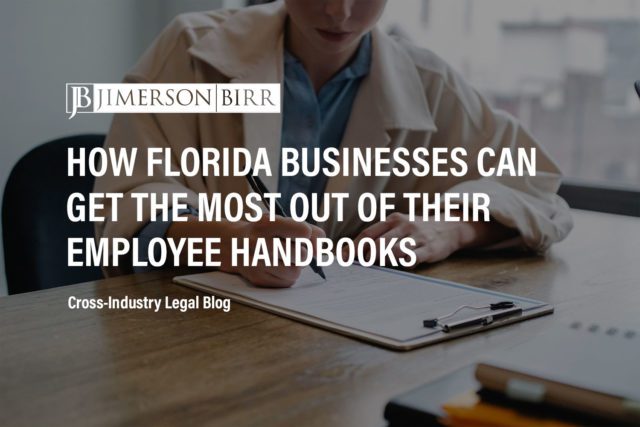What do personnel policies and handbooks encompass?
Personnel policies and handbooks are essential tools for employers to communicate their expectations, guidelines, and procedures to employees. In Florida, personnel policies and handbooks are generally considered non-binding and do not create an employment contract. However, employers should be cautious in their wording to avoid inadvertently creating contractual obligations.
These documents typically cover various topics, including workplace safety, employee conduct, anti-discrimination and harassment policies, attendance and leave policies, and compensation and benefits.
For example, a personnel handbook might detail the company’s policy on workplace attire, outlining acceptable clothing and prohibiting certain types of apparel. Employers must ensure their policies comply with applicable state and federal laws, such as the Florida Civil Rights Act and the Fair Labor Standards Act.
Need help with training, compliance, or litigation to protect your workplace? Schedule your consultation today with a top employment law attorney.
Which laws, rules, and regulations apply to personnel policies and handbooks?
Several Florida and federal laws, rules, and regulations apply to personnel policies and handbooks. Key Florida-specific laws include:
- Florida Civil Rights Act: This law prohibits discrimination based on race, color, religion, sex, national origin, age, disability, or marital status in employment.
- Florida Minimum Wage Act: This act establishes the state’s minimum wage and provides guidelines for overtime pay.
In addition to state laws, various federal laws also apply to personnel policies and handbooks, such as:
- Fair Labor Standards Act (FLSA): This federal law governs minimum wage, overtime pay, child labor, and recordkeeping requirements.
- Title VII of the Civil Rights Act of 1964: This law prohibits employment discrimination based on race, color, religion, sex, and national origin.
- Americans with Disabilities Act (ADA): This act prohibits employment discrimination against qualified individuals with disabilities and requires reasonable accommodations for employees with disabilities.
- Family and Medical Leave Act (FMLA): This law provides eligible employees up to 12 weeks of unpaid, job-protected leave for specific family and medical reasons.
Employers must ensure their personnel policies and handbooks comply with all relevant state and federal laws, rules, and regulations to avoid potential legal issues and litigation.
What common issues associated with personnel policies and handbooks lead to litigation against employers?
When not properly managed, personnel policies and handbooks can lead to disputes and litigation between employees and employers. Common legal risks associated with these documents include:
- Ambiguity and Inconsistencies: Unclear language or policy contradictions may cause confusion and disagreements, potentially leading to legal claims.
- Outdated or Non-Compliant Policies: Failure to regularly update personnel policies and handbooks to comply with federal and Florida state law changes may expose employers to liability.
- Discrimination Claims: Policies that inadvertently discriminate against protected classes under the Florida Civil Rights Act or Title VII can lead to litigation.
- Retaliation and Wrongful Termination: Employees might sue their employers for retaliation or wrongful termination if they perceive that their dismissal resulted from exercising their rights under the FLSA, ADA, or FMLA.
What are the prerequisites to file a lawsuit regarding personnel policies and handbooks, and what legal defenses may employers assert?
To file a lawsuit regarding personnel policies and handbooks, employees must generally satisfy certain legal prerequisites:
- Exhaustion of Administrative Remedies: Before filing a lawsuit, employees may be required to file a complaint with the Equal Employment Opportunity Commission (EEOC) or the Florida Commission on Human Relations (FCHR) and obtain a “right-to-sue” letter.
- Timeliness: Employees must file their claims within the applicable statute of limitations, which varies depending on the specific claim and jurisdiction.
- Standing: Employees must demonstrate that they have suffered an injury or adverse employment action related to the personnel policies or handbooks.
Employers facing litigation related to personnel policies and handbooks may assert various affirmative defenses, such as:
- Safe Harbor Defense: Employers may claim that they made a good-faith effort to comply with the law by implementing compliant policies, conducting training, and promptly addressing complaints.
- At-Will Employment: In Florida, employment is generally considered at-will, meaning employers can terminate employees for any reason as long as it does not violate the law. Employers can argue that the termination was unrelated to the personnel policies or handbooks.
- Statute of Limitations: Employers may assert that the employee’s claim is time-barred due to the expiration of the applicable statute of limitations.
- Failure to Mitigate Damages: Employers can argue that the employee did not take reasonable steps to minimize their damages, such as seeking alternative employment.
To determine whether your unique situation may necessitate litigation or another form of specialized advocacy, please contact our office to set up your initial consultation.
What measures must employers take to create legally compliant personnel policies and handbooks?
To ensure legal compliance with personnel policies and handbooks, Florida employers should implement the following measures:
- Regularly Review and Update Policies: Stay current with Florida and federal law changes to maintain compliance and avoid potential liability.
- Train Management and Employees: Provide training sessions to ensure management and employees understand their rights and responsibilities under the policies and applicable laws.
- Establish Clear Complaint Procedures: Implement procedures for reporting and addressing complaints, including designated contact points for employees to voice concerns.
- Apply Policies Consistently: Consistently apply policies to all employees to avoid claims of discrimination or unfair treatment.
- Consult with Legal Counsel: Seek guidance from legal counsel when drafting, revising, or interpreting personnel policies and handbooks to ensure compliance with Florida and federal law.
Please contact our office to set up your initial consultation to see what forms of legal advocacy or intervention may be available for your unique situation.
Frequently Asked Questions
Can employers include disclaimers in personnel policies and handbooks to protect themselves from liability?
Yes, employers can include disclaimers stating that the personnel policies and handbooks do not create an employment contract and that the employer retains the right to modify or terminate policies at any time. This disclaimer helps clarify that the handbook does not alter the at-will employment relationship.
Are employers required to have personnel policies and handbooks in Florida?
While there is no legal requirement for employers to have personnel policies and handbooks in Florida, having one can provide employers and employees with a clear understanding of their rights and responsibilities and help minimize the risk of legal disputes.
How often should employers update their personnel policies and handbooks?
Employers should review and update their personnel policies and handbooks at least annually to ensure compliance with federal and Florida state law changes. Additionally, employers should update their policies and handbooks whenever there is a significant change in business operations or the law.
Have more questions about employment law compliance or litigation?
Crucially, this overview of personnel policies and handbooks does not begin to cover all the laws implicated by this issue or the factors that may compel the application of such laws. Every case is unique, and the laws can produce different outcomes depending on the individual circumstances.
Jimerson Birr attorneys guide our clients to help make informed decisions while ensuring their rights are respected and protected. Our lawyers are highly trained and experienced in the nuances of the law, so they can accurately interpret statutes and case law and holistically prepare individuals or companies for their legal endeavors. Through this intense personal investment and advocacy, our lawyers will help resolve the issue’s complicated legal problems efficiently and effectively.
Having a Jimerson Birr attorney on your side means securing a team of seasoned, multi-dimensional, cross-functional legal professionals. Whether it is a transaction, an operational issue, a regulatory challenge, or a contested legal predicament that may require court intervention, we remain tireless advocates at every step. Being a value-added law firm means putting the client at the forefront of everything we do. We use our experience to help our clients navigate even the most complex problems and come out the other side triumphant.
If you want to understand your case, the merits of your claim or defense, potential monetary awards, or the amount of exposure you face, you should speak with a qualified Jimerson Birr lawyer. Our experienced team of attorneys is here to help. Call Jimerson Birr at (904) 389-0050 or use the contact form to schedule a consultation.
Here are some blogs written by JB attorneys that provide more information about employment law:
- Independent Contractor or Employee: Know the Difference (jimersonfirm.com)
- Rescinding Job Offers in At-Will Employments in Florida | Jimerson Birr (jimersonfirm.com)
- Tips for Drafting Employee Handbooks in Florida | Jimerson Birr (jimersonfirm.com)
- Understanding The EEOC Process: Employee Sexual Harassment And Sexual Discrimination Claims In The Era Of #MeToo (jimersonfirm.com)
- Contesting OSHA Violations and OSHA Citations: A Guide To OSHA Employer Rights (jimersonfirm.com)
- What Do Contractors Need to Know About Employee Duty of Loyalty and Ability to Compete | Jimerson Birr (jimersonfirm.com)


We live by our 7 Superior Service Commitments
- Conferring Client-Defined Value
- Efficient and Cost-Effective
- Accessibility
- Delivering an Experience While Delivering Results
- Meaningful and Enduring Partnership
- Exceptional Communication Based Upon Listening
- Accountability to Goals











